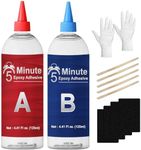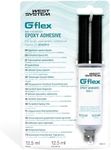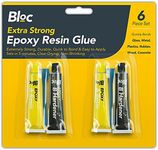Buying Guide for the Best Epoxy Glues
Choosing the right epoxy glue can be crucial for your project, whether you're working on a small craft or a major repair. Epoxy glues are known for their strong bonding capabilities and versatility, but not all epoxies are created equal. Understanding the key specifications will help you select the best product for your needs.Curing TimeCuring time refers to the amount of time it takes for the epoxy glue to fully harden and reach its maximum strength. This is important because it affects how quickly you can use or handle the bonded materials. Curing times can range from a few minutes to several hours. If you need a quick fix, look for a fast-curing epoxy. For more precise or larger projects, a longer curing time might be beneficial as it allows for adjustments.
StrengthStrength indicates how much force the bonded materials can withstand before breaking apart. This is crucial for applications that require a durable bond. Epoxy glues are generally very strong, but they can vary in their tensile and shear strength. For heavy-duty repairs or structural applications, choose an epoxy with high strength ratings. For lighter tasks, a standard strength epoxy will suffice.
ViscosityViscosity is the thickness or flowability of the epoxy glue. This affects how easily the glue can be applied and how well it can penetrate surfaces. Low viscosity epoxies are more fluid and can seep into small cracks and crevices, making them ideal for intricate work. High viscosity epoxies are thicker and better for filling gaps or bonding larger surfaces. Consider the nature of your project to determine the appropriate viscosity.
Temperature ResistanceTemperature resistance refers to the ability of the epoxy glue to withstand extreme temperatures without losing its bonding properties. This is important for projects exposed to heat or cold. Epoxies can be rated for different temperature ranges. For outdoor or high-heat applications, choose an epoxy with high temperature resistance. For indoor or moderate conditions, standard temperature resistance will be adequate.
Water ResistanceWater resistance indicates how well the epoxy glue can withstand exposure to moisture or water. This is essential for projects that will be exposed to wet conditions or submerged in water. Some epoxies are fully waterproof, while others are only water-resistant. For marine or outdoor applications, opt for a waterproof epoxy. For indoor projects or those not exposed to water, water-resistant options are sufficient.
FlexibilityFlexibility refers to the ability of the epoxy glue to bend or flex without breaking. This is important for applications where the bonded materials may experience movement or stress. Flexible epoxies can absorb shocks and vibrations, making them ideal for dynamic environments. For rigid or static applications, a less flexible epoxy will provide a stronger bond.
















